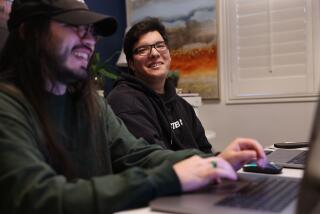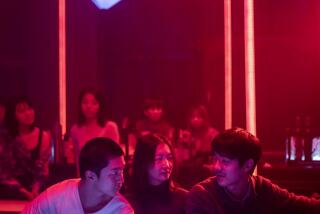Their ‘Dream’ realized
Dressed in black, two dozen Chinese dancers glide across the practice floor, performing a native Malaysian dance about young love and flirtation.
Liu Xiao Cheng is not happy. The gray-haired manager watches intently, grimacing. Finally, he cannot help himself.
“You need more practice with your eyes,” he shouts. “This is a dance about flirtation. They must flutter!”
But the dancers cannot hear his voice. Each one is deaf. They have been paced by the rhythmic hand movements of two sign language assistants, whom they now look to for a translation of their leader’s words. Everyone nods. Eyes flutter.
For two decades, the rail-thin Liu has nurtured a unique cast of more than 100 performers that has inspired audiences to view the disabled in an entirely new artistic light.
The China Disabled People’s Performing Art Troupe features dancers who cannot hear, others who cannot see. There are blind singers and musicians as well as performers with physical deformities: a vocalist with spina bifida. A dancer without arms.
The group has performed worldwide, including in New York and Los Angeles, often to standing ovations. Clips of their work have circulated over the Internet.
Now Liu has taken his act one step further -- to the big screen.
This year, the Beijing Film Academy made a documentary titled “My Dream.” Using lavish sets, the film intersperses performances with poignant behind-the-scenes footage. Though the movie has yet to be released in China, the cast is already aiming for an international audience.
Last month, members attended the American Film Market convention in Santa Monica seeking worldwide distributors. The buzz is that “My Dream” has the right stuff to earn an Academy Award.
“This film deserves to be seen. It’s beautiful,” said Patrick de Bokay, director of the Miami International Film Festival. “Its message is that you are limited, but you are a human being. And you are an artist.”
Liu is impatient. He wants to break international boundaries now.
“We do 150 performances a year, but we only have so much time,” he said. “There are 6.5 billion people in the world, and we want them all to see us. A movie is the only way.”
In one set, ballet dancer-choreographer Tai Lihua leads 20 hearing-impaired dancers in ornate golden costumes in a routine known as 1,000 hands, in tribute to an eastern Bodhisattva. Seen head-on, the arms of the in-line performers move in elegant, breathtaking synchronicity. The act has been posted on YouTube.
In other segments, 16 blind dancers connected by ropes celebrate spring. Ballet performers who have never heard music move to the vibrations of the beat resonating beneath their feet. A Peking Opera act shows deaf dancers performing as blind singers mouth the words to the story.
At each performance, a hearing-impaired host uses sign language to express the troupe’s theme -- that it does not take sight or hearing or full physical faculties to produce gorgeous art.
“Even a decaying tree provides shade. And a wilting flower sends forth fragrance,” she says. “We are trying to hear sounds and rhythms in silence. To see light in darkness. To pursue perfection with disabilities.”
Much of the energy behind the troupe comes from Liu, a 63-year-old former Communist party minister who quit his government post to advocate for the disabled in a country where the physically impaired are often harshly ostracized.
He is passionate about his troupe’s mission. Cigarette in hand, he watches each practice with the eye of a critic. Pacing, posing, even crouching on a chair, he is everywhere at once, expecting perfection, pointing out impossible-to-see flaws.
Though rarely smiling, he nonetheless believes in these young performers he has recruited from across China. He’s part post-Mao-era leader, part fussy coach, part father figure.
Liu is weary of seeing disabled performers patronized as “special ambassadors” -- a diminished status he thinks belies their talents. He believes his troupe bests even China’s top-rung performers. And in 2000, he took a huge gamble to prove it.
He rejected traditional government funding in a move that not only gave him more creative freedom but also allowed him to charge for performances. He banked on the fact that the public would pay to see his troupe -- not as a mere curiosity but for the art they created.
His risk paid off. The group has visited more than 50 countries, netting $7 million after operating expenses over the last five years to become China’s most profitable performing troupe.
Finding his calling
Twenty years ago, Liu Xiao Cheng was vice secretary of China’s fledging Disabled Persons Federation -- a bureaucrat working to improve the lives of the nation’s 83 million disabled citizens.
A former prisoner during the Cultural Revolution, he spent years orchestrating a patient political comeback. But he gave it all up one night after watching a small group of disabled performers.
“I saw hope and the value of life in their dances,” he recalled. “Seeing them, I finally found my calling.”
He formed his own troupe and began traveling the nation to recruit performers -- from the far-flung Xinjian region to out-of-the-way places even most Chinese rarely visit. Some were disabled at birth, others had suffered heartbreaking accidents.
There was the blind bamboo flutist whose eyes were poked by a stick. The dancer who lost both arms in an electrical accident. And the youngsters who lost their hearing from tainted medicine given to them as infants.
The stories of discrimination still anger him. One deaf dancer fell in love, but her boyfriend’s parents at first rejected her: They didn’t want their only son to marry someone so flawed. Another said her mother was so depressed over having a deaf daughter she nearly committed murder-suicide by jumping off a cliff with her baby.
A dancer named Huang Yangguang told of losing both arms to an electric shock at age 5. He learned to write with his feet so he could keep up at school. Students mocked him.
There was the blind flute player who no music academy would recruit because of his lack of eyesight. Or the deaf sign language interpreter who competed in China’s Miss Universe competition.
The judges rejected her, Liu said, because they wanted a normal person to represent China. “Why?” he asks, growing angry as he talks. He rises from a table and paces. “Maybe someone from another planet would see a person with one arm as the most beautiful. Where does our world come up with its idea of beauty?”
Liu gave them all refuge. His Beijing headquarters features practice facilities, dorms and classrooms where the young artists continue their studies as they work out with the troupe.
Slowly, he began shaping their raw talents. Performers learned dance interpretation. They pressed their heads against drums to sense the vibrations. Many were feeling music for the first time.
Art was more than just technique, Liu stressed. It was about spirit and emotion. And these senses they all possessed in spades.
For these societal castoffs, the troupe was a revelation. “How lucky I could be deaf and come here!” said 9-year-old Wang Yimei, who has been deaf since age 4.
Her mother, a troupe volunteer, put her daughter’s enthusiasm in perspective. “There are thousands of misfortunes being deaf,” Li Su Qin said. “This is one lucky thing.”
The troupe cultivates not only the performers’ talents but also their sense of self. A reporter once asked one blind troupe musician if he wanted the ability to see.
“I prefer not,” he responded. “I’m used to my own world. My piano brings me light.”
For Liu’s troupe, 2000 was a pivotal year. That’s when he decided to reject government subsidies that often allow officials to dictate subject matter.
“People thought I was crazy for saying no to the government,” Liu says. “But officials knew I was ideological. So they just said, ‘Let him go.’ ” Liu used his relationship with the party as an umbrella of protection for his performers. “It wasn’t enough for this troupe to arouse people’s mercies,” he said. “We wanted their respect.”
Their first performances were sellouts, and they never looked back. Liu proved that he was not just an artistic mentor but also a shrewd businessman.
And a strict taskmaster. At a recent practice, he chastised a flute player. “No, you already played that. Play something else!”
He cooed encouragement for one dance set, then turned to several sound technicians standing by. “We need new music for this piece,” he snapped. “What we have is all wrong.”
Performers are the stars
Recognition was not coming fast enough. So in 2000, Liu decided have a film made of his troupe. Several well-known Chinese directors -- including Zhang Yimo -- expressed interest. But Liu didn’t want a feature film with actors playing his performers. He wanted them to play themselves.
So he worked with the Beijing Film Academy, one of China’s top film schools, and director Wang Honghai to produce a documentary. The project took 1 1/2 years.
The opening sequence includes lead troupe and dancer Tai Lihua in the studio, struggling to express herself in words.
“To all of us, some things are given, some things are withheld over which sometimes we have no choice,” she says in Mandarin, her voice hoarse and trembling. “But one can always choose one’s outlook on life, and look more on the positive side, and face life’s disappointments with a cheerful and grateful heart.”
With a copy of their new documentary, the troupe also produced several color catalogs of the movie’s production and cast biographies. They sold DVDs on tour.
Then, this fall, came their biggest performance yet -- the American Film Market. And Liu left nothing to chance. The troupe bought four-page advertising spreads in industry magazines such as Variety and the Hollywood Reporter. Advertising placards for the film adorned shuttle buses at the meeting. Trailers played in the lobby and on elevator screens.
“We had no superstar. If we had Richard Gere, we would not have had to have been so aggressive,” Liu said. “We were featuring a second-class people most everyone believes cannot make art.”
The campaign worked. Liu’s marketers were flooded with offers from distributors from several countries. As Matt Kennedy, marketing director for Liberation Entertainment, put it: “The movie just blew me away. It’s the type of product I want to be associated with. It makes people feel good.”
At the convention, one producer told 14-year-old deaf dancer Cheng Cheng that in her native costume she was the most beautiful girl in the world. “I felt so happy,” she said. “I’m just a poor girl from China. And this troupe has changed my life.”
Liu isn’t content with mere ego strokes. He wants to see real change in the lives of China’s disabled, especially artists.
Now the dancer whose future in-laws once rejected her is famous in China, and perhaps they are now not good enough for her, Liu says. The mother who almost killed her hearing-impaired daughter wrote the troupe a letter saying how proud she was of her child. And Huang might not have arms, but he has made enough money to buy a new home in his rural village.
Performers receive a portion of the troupe’s profits. Liu has also created a fund to assist other disabled youth in China. “This troupe is a flower,” he said. “And I want it to bloom all over the world.”
Fresh from his film’s successful reception in Hollywood, Liu is asked if he now has a hot property on his hands. He pauses.
Then he winks.
More to Read
The biggest entertainment stories
Get our big stories about Hollywood, film, television, music, arts, culture and more right in your inbox as soon as they publish.
You may occasionally receive promotional content from the Los Angeles Times.







